- Home
- John Bellairs
The House With a Clock in Its Walls Page 3
The House With a Clock in Its Walls Read online
Page 3
"What's that?"
Uncle Jonathan looked very serious. "It's the word for a male witch." Lewis shuddered. Then, out of nowhere, a strange thought came to him. "Are you one too?" he asked in a tiny, frightened voice.
Jonathan looked at him with a strange smile. "Would it scare you if I said I was?"
"No. I like you an awful lot and you can be a warlock if you want to be one, I guess. You wouldn't be a bad one, I know."
"That depends on how you mean 'bad,' " said Jonathan, chuckling. "If you mean that I wouldn't be an evil one, you're right. If you mean that I wouldn't be too bad at wizarding... well, I don't know. I'm pretty much of a parlor magician, though I have a few tricks that go beyond rabbits and playing cards."
"Like stained-glass windows and coat racks?" said Lewis, grinning.
"Yes. Exactly like those. And just to make you perfectly secure, let me inform you that Mrs. Zimmermann is also a wizard, though in her case the term should be witch."
"Couldn't you find a better name?" asked Lewis timidly.
"Well, she prefers 'maga' or 'enchantrix,' but I can't use such words without breaking up, so she's old witch Florence to me. She's really a much more serious wizard than I am. Got her D.Mag.A.—that's Doctor Magicorum Artium—from the University of Goettingen in Germany in 1922. I just have an A.B. from Michigan Agricultural College."
"What in?" asked Lewis, as if he were interviewing Jonathan for a job. Actually he was interested in Jonathan's college work. Both of Lewis's parents had gone to college, and they always talked a lot about their college work.
"What in?" said Jonathan, blushing. "What in? Why, Agricultural Science. Animal Husbandry and all that. I was going to be a farmer till my grandpa died and left me a pile of money. But back to Isaac Izard. You're still interested, aren't you?"
"Oh, yes! Of course! Please tell me. I want to know."
"Isaac, as I say, was a wizard. He fooled around with black magic, the worst kind of thing a wizard can do. I can't tell you about anything bad that I absolutely know he did—for sure—but if one wizard can judge another, I'd say he was an evil one. A very evil one. Mrs. Zimmermann thinks so too. She lived next door to him for years, remember. You'll have to ask her about him yourself, of course, but there were many evenings when she and I would stand in her back yard and look up and see old Isaac's evil face in the window of the cupola on top of the house. He'd be holding an oil lamp and just staring out at the night. Mrs. Zimmermann claims that he would sit for hours in the cupola during the day. He seemed to be taking notes."
"Gee, that is weird. What was he taking notes for?"
"Lord only knows, Lewis. But I'm sure it wasn't anything good. At any rate, to get on with my story... It must be getting pretty late by now, but without the clocks I have no idea what time it is. Where was I? Oh, yes. Old Isaac died during a wild thunderstorm, one of the worst in the history of Capharnaum County. You can look it up in the New Zebedee Chronicle if you want to: roofs blown off barns, trees uprooted, and a bolt of lightning melted the iron doors on the tomb Isaac is buried in now. I'll have to show you that tomb some day. Ugly old dump—one of those little stone houses for the respectable dead. There are several of them up in our cemetery, some of them really fancy. This one was built by Isaac's family in the 1850's, but it was never used till they put his wife in there. She died before he did."
"What was she like?"
"Pretty strange, as you'd have to be to choose Isaac Izard for a husband. I don't remember anything about her but her eyeglasses."
Lewis stared. "Her eyeglasses?"
"Yes. I passed her once on the street and she turned and looked at me. It might have been the way the sun caught her spectacles, but I remember two freezing circles of gray light burning into me. I turned away and closed my eyes, but those two cold spots stayed there. I had nightmares for a week after that."
"How did she die?" Lewis imagined Mrs. Izard falling from a cliff during a hurricane, or flinging herself from the cupola of the house.
"How? Quietly and mysteriously. No funeral. Some strange-looking people from out of town came and helped Isaac bury her. After that, he went into seclusion. Further seclusion, that is. He and she had always been hermits, but after her death he really shut himself up. Built a big high board fence between this house and Mrs. Zimmermann's. I had it torn down as soon as I moved in." He smiled contentedly. Lewis felt that his Uncle Jonathan was happy living at 100 High Street, despite the fact that old Isaac Izard had made the place his castle.
"Is that all there is to the story?" asked Lewis cautiously.
"Oh, my, no. We're just getting to the good part. Look, here I am selfishly puffing away at this boat, and you have nothing. Let's go out to the kitchen and get a couple of glasses of milk and some chocolate-chip cookies. Okay?"
"Sure!" said Lewis, who liked chocolate-chip cookies even more than he liked Welch's Fudge Bars.
In a few minutes they were back in the study, sitting by the quietly crackling fire and munching cookies. Suddenly a book fell out of the bookcase. Flop. Two more fell out. Flop. Flop. Lewis stared at the black gap in the row of books. A long, withered, bony hand appeared. It seemed to be groping for something.
Lewis sat rigid with terror, but Jonathan merely smiled. "A little to your left, my dear. That's it. Now you've got it."
A latch clicked and a large section of the built-in bookcase swung outwards. More books fell to the floor. And there stood Mrs. Zimmermann, with a strand of cobweb hanging from her left eyeglass. Her sleeve was covered with whitish dust.
"Fine way to build a secret panel," she grumbled. "With the latch on the room side instead of on the passage side."
"It adds to the mystery, Doll Face. As you might have guessed, Lewis, this house has a secret passageway. You enter it through the china cupboard in the kitchen. Come on in, Florence. I was just going to tell Lewis about the clock in the walls."
Mrs. Zimmermann gave him a look as if to say, "Do you think that's a wise thing to do?" But she shrugged and helped herself to the cookies and milk.
"Good cookies," she said, munching. "Very good."
"She always says that because she makes them," explained Jonathan, helping himself to two more. "And now that everyone's mouth is stuffed, including mine, I guess I'll go on. Where were we? Oh, yes. Well, I had no sooner moved in here than I felt that something was wrong. The house had a kind of listening stillness. And then I heard it."
"Heard what?" This was Lewis, who had worked himself to the edge of his chair. He had even stopped eating his cookie.
"The clock. You know how you can be in a room with a clock ticking, and you won't notice it for a long time. Then, when things are very, very quiet and you aren't thinking about anything in particular—there it is!"
Lewis jumped up and looked around wildly. "Where?"
Jonathan laughed. "No, no, no. I didn't mean to frighten you like that. I mean I heard it for the first time in this room. It was ticking away in the walls. You can go over to that wall and listen for it, if you like."
Lewis got up and walked over to the book-lined wall. He put his ear to a row of black leather volumes and listened. His eyes opened wide.
"It is there, Uncle Jonathan! It is!" He was excited by the discovery, but then his face changed. He looked afraid. "What is it for, Uncle Jonathan? What does it do?"
"I haven't the faintest idea," said Jonathan, "though I know that I want to blot it out. That's why I have all these stupid clocks. I didn't used to be so fond of incessant ticking and sudden, loud, hell raising every hour on the hour. But I prefer my clocks to his."
Jonathan's face had turned grim. He shook his head, smiled a little half-hearted smile, and went on. "You may be wondering why I don't just tear down the wall and rip out the clock. Well, it wouldn't do any good. It sounds like it's behind every wall: up in the attic, down in the cellar, in the closets and storerooms and parlors. And sometimes it seems to be slowing down. I keep hoping it will stop. But then it picks up and kee
ps going. I don't know what to do." There was a note of real despair in his voice. For a minute Lewis thought his uncle would cry. Then Mrs. Zimmermann broke in.
"I'll tell you one thing you ought not to do, Jonathan Barnavelt. You oughtn't to frighten Lewis with something you don't know anything about. After all, the ticking may be some leftover magic from the old coot's experiments. Or death-watch beetles. Or an illusion of some kind, like in houses that have whispering galleries. I get a funny kind of hum in my head now and then. It goes dooooo for a while and then it goes away."
Jonathan looked irritated. "Oh, Florence, there's no need to kid around. You don't think it's something harmless and neither do I. I wouldn't have told Lewis just to frighten him. But I thought it would be better for him to know about the clock than to think that his uncle was getting ready for the loony bin. You see, he caught me making my nightly rounds."
"Well," said Mrs. Zimmermann, "I don't know about the loony bin, but Uncle Jonathan had better be getting ready for beddy-by if he's going to take us on a picnic tomorrow." She reached into the folds of her dress and pulled out a silver watch on a long chain. She popped the lid open and announced that it was three a.m.
Jonathan looked up with surprise. "It is? Good grief, I had no idea-"
"Please, Uncle Jonathan," said Lewis, interrupting. "Can you tell me one thing more?"
"Sure, Lewis. What is it?"
Lewis looked fidgety and embarrassed. "Well... if the clocks are supposed to drown out the noise of the clock in the walls, why do you stop them at night?"
Jonathan sighed. "I don't stop them every night. Some nights I just walk around checking all the rooms. It makes me feel secure, somehow. I can't explain it. But some nights, like this one, I get the urge to stop all the blasted everlasting ticking. I get the feeling that if I were to make the house quiet—perfectly quiet—then maybe I could hear the real clock, the magic one, ticking behind one particular wall, or in some cubbyhole. But it never works, and I always feel half crazy for trying."
Lewis still looked puzzled. "If it's a magic clock," he said slowly, "then wouldn't it be invisible? I mean, wouldn't it be something you couldn't actually put your hands on?"
Jonathan shook his head. "Not really, Lewis. Most magic is accomplished with solid everyday objects. Objects that have had spells said over them. One witch I knew tried to obliterate her enemy by leaving a photo of him under the running water of her gutterspout. Her reasoning was that he would die when the face on the picture was wiped out. It's a common method. No, Lewis. This is a clock as real as grandpa over there. Only it's enchanted. But what it is enchanted to do I don't for the life of me know."
"Well, I know something, Weird Beard," said Mrs. Zimmermann, dangling her watch like a pendulum before Jonathan's eyes, "I know that if we don't catch just a little, teeny bit of shut-eye, we're all going to be wearing our crabby caps in the morning. Lewis, off to bed. Jonathan, same with you. I'll rinse the cookie plates and put away the milk."
Later, up in his room, Lewis stood in the middle of the floor staring at a patch of flowered wallpaper near the fireplace. He walked quickly over to the wall and put his ear to it. Yes, the ticking was here too. He walked across the room and listened to another wall. More of the same.
Lewis walked back to the center of the room and then, abruptly, he began to pace. He paced in quick strides with his hands behind his back, the way he had seen his father do when he was upset. He paced and tried to think logically. But logic wasn't much help where the clock in the walls was concerned, so at last Lewis gave it up. He jumped into bed and went to sleep.
CHAPTER THREE
On the first Monday after Labor Day, Lewis started going to school in New Zebedee and, before long, he had forgotten all about the mysterious clock in the walls. He had troubles enough of his own.
They weren't new troubles. They were the troubles that a fat boy who can't play baseball carries around with him from place to place. Lewis had always been overweight. He couldn't remember a time when he hadn't been. All his life—all ten years of it—he had been listening to children who chanted:
Fatty, fatty, two by four
Can't get through the kitchen door.
Sometimes he wanted to beat up the kids who made fun of him, but he couldn't box and he wasn't very strong. That was another problem. But the worst problem of all was the baseball problem. Lewis still spun all the way around when he swung at a ball, and he threw his bat. At first he tried to excuse himself by saying, "Watch out, I'm gonna throw the bat!" But the other kids said, "Look, you throw the bat and we're gonna beat you up. You hang onto it when you swing or you can't play."
That is what they said when they let him play, which was not very often. Most of the time when he lined up to be chosen he was the last one left, and the captain of the side that was supposed to take him usually said, "Why do we hafta take him? He can't field, he can't hit, he can't pitch. He can't even run. Come on, we'll play one man short."
What they said about Lewis was true. Sometimes a new boy or a kind boy would get to be captain, and he would choose Lewis for his team. But when Lewis came to bat, he usually struck out. If he hit the ball, it popped up and the pitcher caught it. Or he might ground out to first base. When his team was out in the field, the boys made Lewis play right field, because not many balls got hit out that way. But when one did, Lewis always dropped it, unless it hit him on the head. He would stagger back and forth as he tried to keep track of the ball that hung there, high over his head, but he always got dizzy and covered his face with his glove and screamed "No! No!" as the ball came down. After a while even the kind boys turned him down.
One afternoon, when the usual routine had been gone through, and Lewis had run off the field sobbing because they would not let him play, he found himself standing at home plate on a baseball diamond that wasn't being used that day. At his feet was a bat, a thick old club with a split handle that had been wrapped up with black friction tape. There was a softball nearby, or what was left of one: a black, sticky, egg-shaped lump covered with string. Lewis picked up the ball and bat. He threw the ball into the air and swung at it. He missed. He picked the ball up and tried again. Again he missed. He was about to try for the third time when someone said, "You're doin' it all wrong."
Lewis turned and saw a skinny boy about his own age squatting next to the bicycle rack. There was a big fluff of brick-red hair on top of the boy's head, and his right arm was in a sling. The boy was Tarby.
Everybody in the school knew who Tarby was. Even Lewis knew, and he had only been in New Zebedee for a couple of months. Probably everyone in New Zebedee and most of the people in Capharnaum County knew who Tarby was. At least, that was the impression that Lewis got. Tarby was the most popular boy in the school. He was a daredevil, the kind of boy who rode his bicycle through bonfires and hung by his knees from the limbs of trees. All the girls liked him, and he was the big home-run hitter in the softball games. He got chosen first so often that most of the time the boys made him a captain, just to avoid all the fighting over who got to have Tarby on their team. But here he was with his arm in a sling, watching Lewis as he tried to hit the ball.
"I said, you're doing it all wrong. You're supposed to keep your feet planted flat. Then you swing from the hips. Here. Let me show you."
Tarby scrambled to his feet and walked over to where Lewis was standing. He grabbed the bat and hefted it in one hand, choking up on it a bit.
"Okay," he said, "get out there and pitch. Just lob it 'ere."
Lewis had never seen anyone trying to hit a ball with the bat held in only one hand. He was afraid that Tarby would miss and get mad and go home. With a nervous grin on his face, Lewis lobbed the ball toward the plate. Tarby swung and the bat connected. Clack! It struck the ball with that rickety hollow sound that split bats have. The ball shot on a line toward center field. It would have been a clean single.
"See? And that's just with one arm. You ought to be able to do that well with two. C'mon. I'
ll pitch."
Lewis walked in from the pitcher's mound and took the bat from Tarby's hand.
"I didn't know your arm was broken," said Lewis shyly. "How'd you do it?"
"Fell out of a tree. I was hanging by my knees. Upside down, like in the monkey house. It's okay. It'll heal up."
Tarby walked out to the mound. Lewis pounded his bat on the plate and waved it the way he had seen George Kell do in Briggs Stadium in Detroit. But when Tarby threw the ball, Lewis missed as usual.
Every day for the next two weeks Tarby met Lewis after school, and they practiced batting. Slowly, gradually, Lewis's swing got better. He even managed to hit a few line drives. But something even more important was happening. Lewis and Tarby were getting to be friends. Tarby liked Lewis's jokes, and Lewis found out that Tarby hated some of the kids that he hated. Lewis liked Tarby's imitation of Mrs. Fondrighter, a mean teacher at school. Mrs. Fondrighter always called her husband "Jerrold," which was a funny thing to do. Tarby made a loop in the end of a green twig and pretended it was an eyeglass on a stick. Then he would stare through the loop at Lewis and say, in a high voice, "How deah you say such things to me, Jer-rold!"
Then Lewis and Tarby would sit around planning how they were going to take care of Carol Kay Laberdeen, a snotty girl in the sixth grade who got away with murder because her father was on the school board. It was usually dark by the time Lewis and Tarby said goodby to each other by the mailbox at the bottom of High Street.
One afternoon early in October, Lewis and Tarby were out at the athletic field playing flies and grounders. Lewis had gotten good enough so that he could hit Tarby some pretty long fly balls. Tarby's arm was still in a cast, but he picked off the line drives and caught the pop flies as easily as if he had had two hands.

 The Curse of the Blue Figurine
The Curse of the Blue Figurine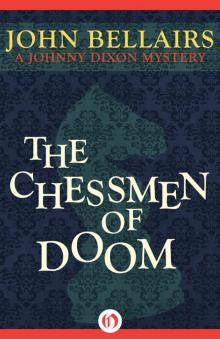 Chessmen of Doom
Chessmen of Doom Secret of the Underground Room
Secret of the Underground Room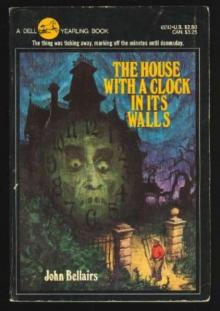 The House With a Clock in Its Walls
The House With a Clock in Its Walls The Vengeance of the Witch-Finder
The Vengeance of the Witch-Finder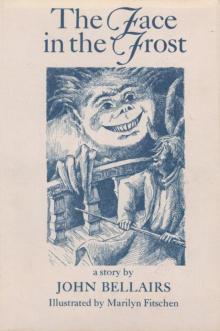 The Face in the Frost
The Face in the Frost Revenge of the Wizard's Ghost
Revenge of the Wizard's Ghost Spell of the Sorcerer's Skull
Spell of the Sorcerer's Skull Eyes of the Killer Robot
Eyes of the Killer Robot Mummy, the Will, and the Crypt
Mummy, the Will, and the Crypt Wrath of the Grinning Ghost
Wrath of the Grinning Ghost The Mansion in the Mist
The Mansion in the Mist The Doom of the Haunted Opera
The Doom of the Haunted Opera The Bell, the Book, and the Spellbinder
The Bell, the Book, and the Spellbinder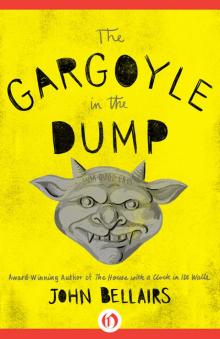 The Gargoyle in the Dump
The Gargoyle in the Dump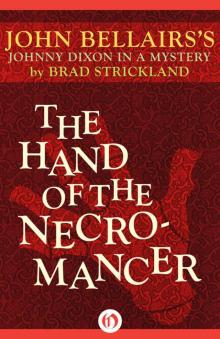 The Hand of the Necromancer
The Hand of the Necromancer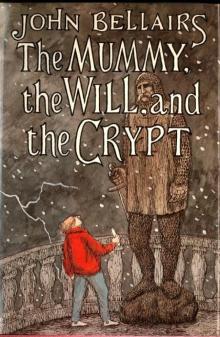 The Mummy, the Will, and the Crypt
The Mummy, the Will, and the Crypt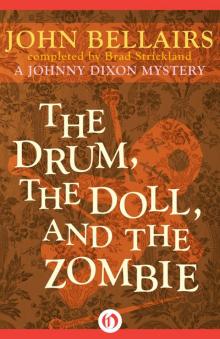 Drum, the Doll, and the Zombie
Drum, the Doll, and the Zombie The Specter from the Magician's Museum
The Specter from the Magician's Museum The Letter, the Witch, and the Ring
The Letter, the Witch, and the Ring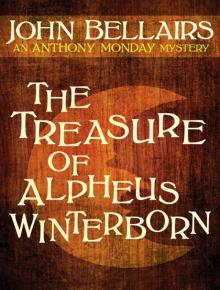 The Treasure of Alpheus Winterborn
The Treasure of Alpheus Winterborn The Dark Secret of Weatherend
The Dark Secret of Weatherend The Figure in the Shadows
The Figure in the Shadows